

Miami designated "Voter Friendly" in inaugural Voter Friendly Campus program
 Miami University’s Oxford and Hamilton campuses are among 83 campuses nationwide designated as a “Voter Friendly Campus.” This is the inaugural class for the Voter Friendly Campus designation program, led by national nonpartisan organizations Campus Vote Project (CVP) and NASPA – Student Affairs Administrators in Higher Education.
Miami University’s Oxford and Hamilton campuses are among 83 campuses nationwide designated as a “Voter Friendly Campus.” This is the inaugural class for the Voter Friendly Campus designation program, led by national nonpartisan organizations Campus Vote Project (CVP) and NASPA – Student Affairs Administrators in Higher Education.
These activities can be institutionalized for years to come, keeping students engaged as they enter and move through their time at school.
Miami’s Oxford and Hamilton campuses were evaluated based on campus plans about how they would engage student voters in the fall of 2016, how they facilitated voter engagement efforts on campus and a final analysis of their efforts.
The designation is valid through December 2018.
Miami University Oxford Campus – Voter Engagement Plan
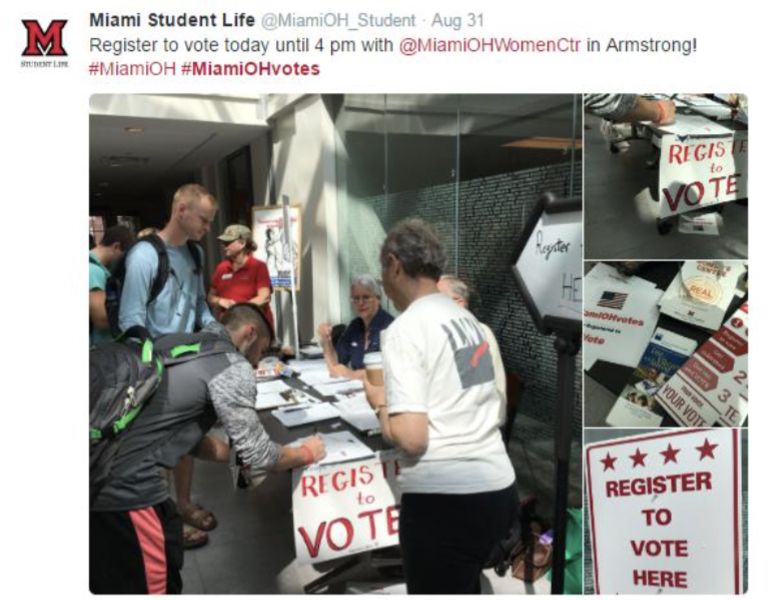
Voter registration at the Armstrong Student Center. In all, 737 new voter registration forms were submitted on the Oxford campus.
Earning the Voter Friendly Campus designation was a campuswide effort that began over a year ago, said Jessica Weasner, assistant director of the office of community engagement and service. A campuswide coalition was formed last summer to develop and implement civic engagement programming pre-election.
“Many of our students are first-time voters, so it's important to ensure that they have the information and access to become engaged in the political process,” Weasner said. “Developing a campus plan resulted in more effective collaboration on existing programs and services and helped us to identify gaps.”
3 Main Goals
The coalition identified three main goals to meet the Voter Friendly Campus designation:
- Increase voter registration.
- Increase voter turnout.
- Offer more opportunities for students to engage in civic learning experiences.
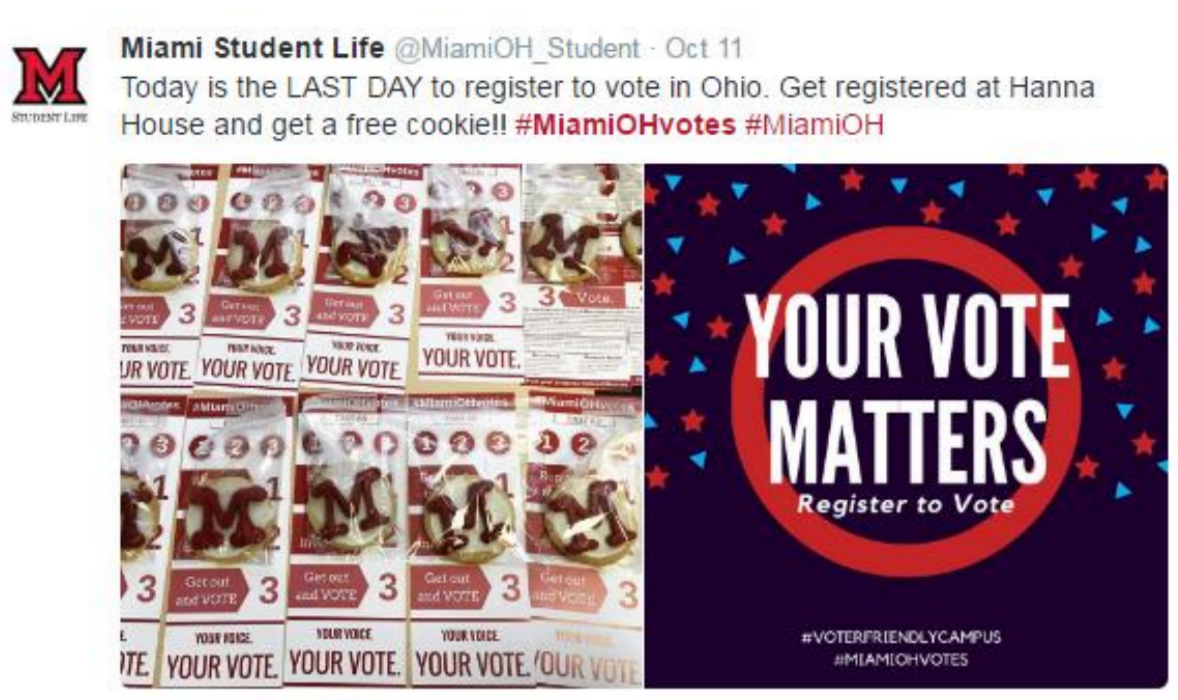 New initiatives included a voter registration training session, official voter registration locations in two campus locations, early voting bus trips, election day tabling and the #MiamiOHvotes hashtag.
New initiatives included a voter registration training session, official voter registration locations in two campus locations, early voting bus trips, election day tabling and the #MiamiOHvotes hashtag.
Even though many new initiatives were developed, there is still much room for improvement in the area of voter education, Weasner said. Staff observed confusion from students about where to register (home or campus), how to vote (it’s okay to leave things blank), and who local candidates were.
Top 3 Successes
- Voter Registration Support: Miami students were able to pick up a voter registration form, complete it and submit it at three designated locations on campus. The staff at these locations were trained on how to complete the forms correctly and were able to provide appropriate guidance to students.
- A “Your Voice, Your Vote” pamphlet with information about voter registration, with appropriate links and deadlines, was created and distributed to students at various events.
- Response to Election Results: After the November election, Miami President Greg Crawford sent an email to all students inviting them to a community dialogue. A workshop for students about free speech demonstrations was offered in early December.
Additional workshops about the rights and responsibilities of citizens and how to engage with elected officials are scheduled for spring 2017.
Miami University Hamilton Campus – Voter Engagement Plan: “Engage The Election”
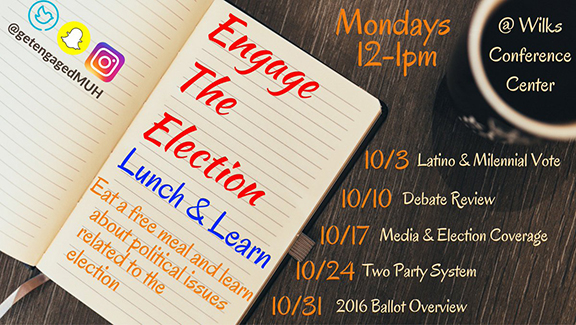 Miami University Regional's Center for Civic Engagement established partnerships with various departments and community organizations to help provide programming for students and the public during the 2016 election season, said Sarah Woiteshek, director of the center. "Our programming at the Miami Regionals Downtown Hamilton Center is always open to the public," she said. "We have found that the community now connects with us intentionally, as they know we are the home for unbiased representation on the issues/candidates."
Miami University Regional's Center for Civic Engagement established partnerships with various departments and community organizations to help provide programming for students and the public during the 2016 election season, said Sarah Woiteshek, director of the center. "Our programming at the Miami Regionals Downtown Hamilton Center is always open to the public," she said. "We have found that the community now connects with us intentionally, as they know we are the home for unbiased representation on the issues/candidates."
"Engage the Election" programming was organized to provide voter education and engagement.
3 Main Goals
The main goals for 2016 election season were to:- Provide access to voter registration.
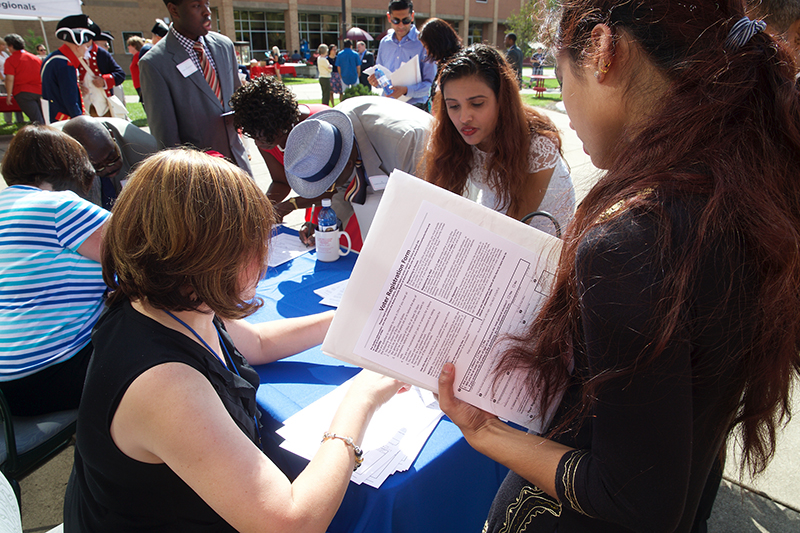
New citizens registered to vote after the Naturalization Ceremony held at Miami Hamilton Sept. 15, 2016.
- Provide bipartisan voter education information, not just for the presidential election, but also for the state and local races/issues .
- Engage students in meaningful ways to learn about the process of voting and see real application of the democratic process.
Top 3 successes
- The Mock Election: Students were able to use actual voting machines and use the 2016 Ballot to submit their mock vote. "We ran the check-in process and the voting process exactly how it would be at a polling location, thanks to the Butler County Board of Elections. For many students it was their first experience with voting. It was one of the most highly attended programs this fall," Woiteshek said.
- Naturalization Ceremony: 86 immigrants became new American citizens during a Naturalization Ceremony held on campus during Citizenship and Democracy Week. The event is a "reminder of the power of the responsibility" of American citizenship, and students continually mention this as a powerful event for them, Woiteshek said.
- Meet-the-Candidates Night: Allows students and the public to come together and meet the candidates. "We invite all candidates on the ballot (with the exception of judges/sheriff). We always get a full house downtown for people to learn and ask questions of the candidates," Woiteshek said.
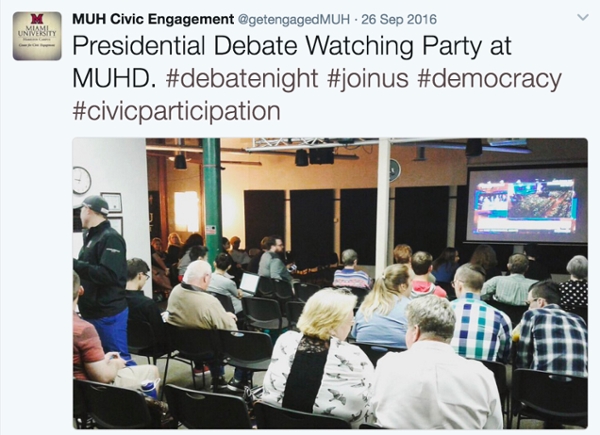 Student workers from the Center for Civic Engagement ran various events for voter registration, which resulted in 98 students registering to vote. Other programming included a series of Speak Out! Community Dialogues; Debate Watch Parties; and five Engage the Election Lunch and Learns in October.
Student workers from the Center for Civic Engagement ran various events for voter registration, which resulted in 98 students registering to vote. Other programming included a series of Speak Out! Community Dialogues; Debate Watch Parties; and five Engage the Election Lunch and Learns in October.
Also named a "Partner in Democracy"
The Center for Civic Engagement was named a Partner in Democracy by the Butler County Board of Elections and the Ohio Secretary of State's office. The center partnered with the Butler County Board of Elections to provide student volunteers as poll workers.
Voter Friendly Campuses
Miami’s efforts to break down barriers and empower students with the information and tools they need to participate in the political process “take the idea of the civic mission of higher education to prepare students to participate in our democracy and turn it into action,” the Campus Vote Project noted.
The 83 institutions designated Voter Friendly Campuses for 2017 represent a wide range of two-year, four-year, public, private, rural and urban campuses, with a total enrollment of nearly 1.4 million students, according to the organization.

